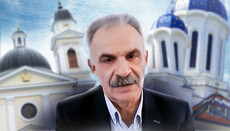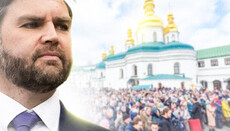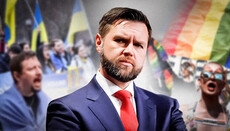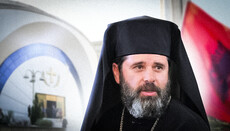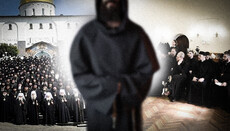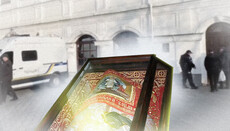Have Filaret and Epiphany read the Gospel?
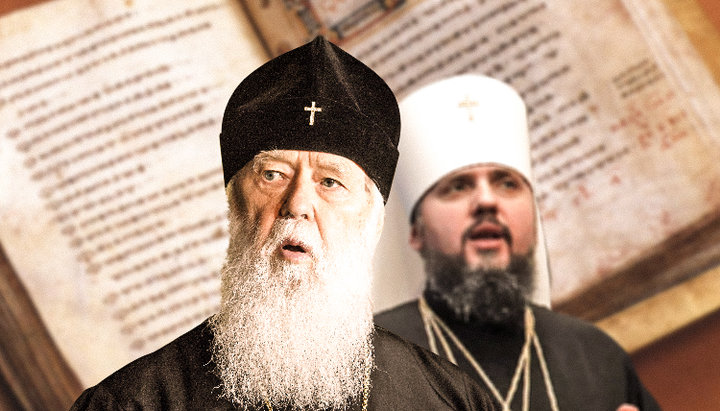
The conflict between the leader of the OCU Epiphany Dumenko and the “Honorary Patriarch” Filaret Denisenko is gaining momentum.
Filaret Denisenko wants to take power from Epiphany Dumenko and reclaim the Kiev Patriarchate, which, as it turned out, still exists de jure.
The other day, Filaret blatantly banned from priesthood the Rector of the Theological Academy of the OCU Alexander Trofimliuk, Epiphany’s supporter.
By his order of May 29, Epiphany recalled the illegality of the existence of the UOC KP and reinforced his authority as the head of the OCU. He mobilized all the media resources led by TSN, who have recently sung the praises of Filaret, and now are dragging their recent idol through the mud. The young "Metropolitan" even attempted to retireFilaret – but no such luck.
However, Filaret has attended the celebration of Epiphany’s saint’s day recently. Judging from the photo, where the “honorary patriarch” is standing alone in the altar, while Epiphany is receiving greetings on the ambon, relations remain strained and there is no reconciliation.
The confrontation is deepening, scandals in the OCU are multiplying. In an appeal addressed to Epiphany, the clergy of the Kherson Eparchy of the OCU expressed disagreement with the position of “Archbishop” Clement (Kushch) of Simferopol and Crimea, who spoke in favour of Filaret. “Metropolitan” Joasaf (Shibaev) of the OCU protested against the inclusion of the Greek Epiphanius (Dimitriou) in the “episcopate” of the OCU and accused him of dictatorship in sharp terms. Trofimliuk, banned from ministry by Filaret, said that he did not agree with his ban and did not intend to obey Filaret.
One could laugh at this fuss if it were a question of some politicians or businessmen. But all this is happening in an organization that calls itself the Orthodox Church of Ukraine!
Such episodes once again lead us to remember that the OCU was created by Petro Poroshenko within the framework of the “army-language-faith” concept. There were no spiritual goals, it was a completely political project. Money, power, candidates for primacy, the status of organization, forms of state support, the "stakes" – these were the topics discussed when creating an unrecognized structure in the church world. Therefore, now there is a war for power, money, influence, hierarchical posts, state aid and so on.
The very way of creating the OCU speaks for itself. The initial principles of modelling this ecclesiastical and political structure programmed it to depend on external forces such as state support, cash infusions, and PR companies in the media. In the case of the disappearance of the external supporе, there is inevitable decay. The OCU will never go beyond the limits of the initially defined “army-language-faith” paradigm because it was born in this semantic field.
* * *
The convulsive struggle for power between Filaret and Epiphany is a litmus test, which reveals the spiritual and moral state of the OCU. A fish rotting from the head is a dead fish. But Dumenko and Denisenko would have a model to follow in the issue of dual power if they were true, not excommunicated, Orthodox Christians.
Once Filaret graduated from the Moscow Theological Academy and served as dean of the Trinity-Sergius Lavra. He must have often had to kiss the relics of St. Sergius of Radonezh resting in the monastery. Filaret cannot but know the life of St. Sergius. But Sergius of Radonezh is a man who did not agree to be hegumen for many years, despite the strong requests of the brethren and personally Metropolitan Alexy of Moscow. This is a man who later abandoned hegumenity and his monastery, not wanting to divide the brethren into parties.
Money, power, candidates for primacy, the status of organization, forms of state support, the "stakes" – these were the topics discussed when creating the OCU.
The attitude of St. Sergius to the authorities is worth dwelling in more detail. Let's look at his life.
When the brethren asked Sergius to become the hegumen, the saint answered them that “the desire for hegumenity is the beginning and the root of lust for power”. St. Sergius literally fled from power and reasoned that "being a subordinate, he would be more comfortable in arranging his salvation work than when he took upon himself the difficult care of saving others".
The paradox is that Sergius himself founded the hermitage (pustyn), built a church and did not want to rule over all of this. Another person would say: "This is my child and I must lead it – and no one else." So, as Filaret said about the OCU. But Sergius was a completely different person.
He refused power because he was alien to temporary goods. Living in poverty and often starving, he did not want to exchange this life for "all the kingdoms of the world". He was in harmony with God – what else could he want?
Although in the long run, Sergius had to become a hegumen, hegumenity burdened him rather than attracted. One day, when his brother Stefan arrived at the monastery, Sergius accidentally heard Stephen drop in some conversation: “Didn't I start this place?” The saint, being a meek and humble person and not having the slightest thought in his heart to defend his hegumenity, left the monastery.
The then Primate of the Russian Orthodox Church, Metropolitan Alexy, being an old man, was looking for a successor. His choice fell on Sergius. But the latter categorically refused: "Forgive me, Holy Vladyka, you want to put the burden on me more than I could bear." Sergius's ministry was prayerful, his sensitive to grace soul could not accept the high-level service of the bishop, which he honestly told Alexy.
St. Sergius used hegumen’s authority exclusively for the benefit of the brethren. He perceived his hegumen’s rank as a ministry, while he always remained a monk and lived in poverty, pleasing God with a simple monastic life.
Sergius expressed the vision of his ministry with the words: “It is better to learn than to teach; it is better to obey than to rule; but I fear the judgment of God; I do not know what pleases God; let there be the Lord’s holy will!”
* * *
For any morally adequate person, the behavior of St. Sergius is quite understandable. Power is a great temptation and enticement, which not every person is able to resist. St. Filaret of Chernigov once said: "People fight with each other for power, and through it there is a discord in business, a discord in hearts, and they destroy themselves and others with a thirst for power." In a spiritual sense, power is extremely dangerous!
That is why our saints never sought power, but on the contrary, they fled from it. Some devotees were so opposed to taking up positions of authority in the Church that they even went to the extreme self-harm — only so that they would not be ordained as priests or bishops.
The Church history remembers the so-called “long brothers” – four monks of the Nitrian desert of the 4th-5th centuries, enjoying extraordinary respect among monks and bishops due to their theological knowledge and strict monastic life. Patriarch Theophilus of Alexandria wanted to ordain one of the brothers, Ammonius, as bishop. When the servants of Theophilus came to the monastery to take Ammonius and bring him to the patriarch for ordination, Ammonius snatched the lancet, cut off his left ear and said: "Now I am crop-eared and – according to Moses' law – have no right to bishopric!" The servants in a low mood returned to Theophilus. But the patriarch declared that he would have ordained Ammonius if he had been even crop-nosed, and once more sent servants after him. The latter again came to the monastery, but Ammonius promised to cut out his tongue and thus make the bishop’s ministry impossible for himself.
"People fight with each other for power, and through it there is a discord in business, a discord in hearts, and they destroy themselves and others with a thirst for power."
St. Filaret of Chernigov
Of course, these are some extremes that are not proposed to copy at all. The message is important: the devotees and saints of the Church fled from power and saw in it the source of great temptations. They became senior officials only with blessing and special requests.
Let’s also remember Reverend Anthony and Theodosius of the Caves. Theodosius was chosen the hegumen by the brethren, not Anthony. Rev. Anthony accepted the choice of the brethren with humility. He helped Theodosius with prayer and advice — but without imposing himself, and certainly not trying to usurp power. Theodosius himself came to Anthony when he considered it necessary, asked for his advice and prayers. Anthony even dug a well separate from the brethren to be as inconspicuous as possible.
This is real Christianity! Both are saints, both are people of the high Christian life, but no one ever stands out, boasts, pulls upon himself a blanket of power, or plots against one another. Because here the goal is different: soul salvation, service to God and neighbour. This is not the “army-language-faith” credo, but the Holy Church.
For a man who lives a truly spiritual life, the problem of superiority does not exist at all. He is interested in God, the salvation of the soul. And even if he is placed on a high-level ministry, he does not hold on to it, but on the contrary, he always wants to get rid of it as soon as the opportunity presents itself.
Christianity is based not on worldly principles of government but on humility and mutual love. Without them, there is no Christianity.
* * *
Christ constantly rejected the glory of man. “I will give you all their authority and splendor; it has been given to me, and I can give it to anyone I want to. If you worship me, it will all be yours,” (Luke 4, 6-7) this was one of the temptations of Christ by the devil in the desert. Through worship, the demon offered authority to Jesus Christ, this unlimited access to all the benefits of the world — what many people pursue. But the Lord answered: “Get thee behind Me, Satan; it is written: ‘Worship the Lord your God and serve him only.’” (Luke 4, 8).
Christ taught not to do good work for show and asked the people he healed not to tell anyone. After the people were filled with five loaves, they wanted to proclaim him king, but he withdrew.
“Anyone who wants to be first must be the very last, and the servant of all,” (Mark 9, 35) the Lord said.
Observing the behavior of the leaders of the OCU, sometimes I want to ask: Have they read the Gospel? Are they Christians? After all, what they are doing is some kind of anti-gospel, anti-Christianity. There is no Christ there. There is only a struggle for a place in the sun, hierarchical rivalry, political calculation, satisfaction of personal ambitions, making money, a principled desire to mess with Moscow and unquestioningly follow the instructions of "Western partners".
But Christ says: “Every kingdom divided against itself is brought to desolation, and every city or house divided against itself will not stand” (Mark 12, 25). Politicking, intrigues and mutual betrayal, scandals and squabbles – this is the inevitable path of the OCU because nothing else was originally laid there. And this path will end with destruction and fall because this is what Christ determined. These are spiritual laws that no one can change.
Christianity is based not on worldly principles of government but on humility and mutual love. Without them, there is no Christianity.
Perhaps it is worth seriously asking the question whether these people have any faith at all. “How can you believe when you receive glory from one another and do not seek the glory that comes from the only God?” (John 5, 44) asks Christ. He asks Filaret, Epiphany and their ilk. Everyone who spares no effort to save their throne and shatter the throne of another one.
Therefore, Filaret cannot leave because he has no faith. If he had faith in Christ and in His Kingdom, which is not of this world, he would not hold on to his patriarchal status, which he made up. What a great moralistic example of humility it would be for the whole church history if he repented and returned to the Church! But alas. For now, he is making another choice.
By the way, Filaret and Epiphany have someone to pay attention to when assessing their actions – His Beatitude Onuphry, who did not seek the throne of the Kiev Metropolitan and refused it as much as he could. Metropolitan Onuphry took office with humility, obeying the will of God. How different it is from the ugly war for church power, which we see now in the OCU.
May God help them all wise up and come to the knowledge of the truth. We will continue to ask the Lord to reason with them and return the lost, although the situation is extremely sad and there is almost no hope for repentance of the schism-makers. Unless a miracle happens ...
